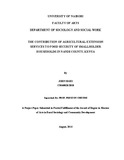| dc.description.abstract | The purpose of this study was to determine the contribution of agricultural extension
service on household food security in Nandi County. The specific objectives of the study
were to assess the household head demographic characteristics, establish the level of
access to extension information by households and its effect on food security, determine
the level of farmers’ accessibility to credit and its effect on household food security, find
out the farmers’ level of adoption of inputs and practices recommended by the extension
services and how it affects food security of smallholder households and to determine the
food security situation of households in Nandi County.
The study adopted a survey research design where the target population was 14,489
households in Tinderet District. The study used purposive sampling to select 2 locations
from the 15 available in Tinderet. Purposive sampling was again used to select 4 sublocations
from each of the sampled locations. Eight villages were then sampled from the
sampled sub-locations and 15 households sampled randomly to bring the sample size to
120 households. The researcher sampled 12 key informants to provide indepth
information on the effect of extension services on the food security in Nandi County.
Data was collected using questionnaires and interview schedules. Data was analysed
using descriptive statistics.
The study established that the food security situation in the district was dire even though
farmers harvested maize and beans. The study further established that farmers adopted
inputs and practices recommended by the extension services such as improved seeds,
timely preparation of land and planting and timely harvesting among others. However,
respondents found difficulty in accessing credit. Finally, the study established that
households accessed information through the radio broadcast and field demonstrations.
The study recommended that the farmers should be encouraged to diversify and stop
looking at maize as the only food crop but explore other foods crops such as bananas,
potatoes among others; the government should lower the farm inputs through subsidies to
encourage the farmers to use fertilizer in planting; the government should make it easy
for the farmers to access credit through state enterprises like Agricultural Finance
Corporation where the requirements such as demand for collateral will be relaxed for the
farmers so that more and more farmers can access credit and; more extension officers
need to be employed to reach more farmers and to do more follow-ups on farmers. | en_US |

